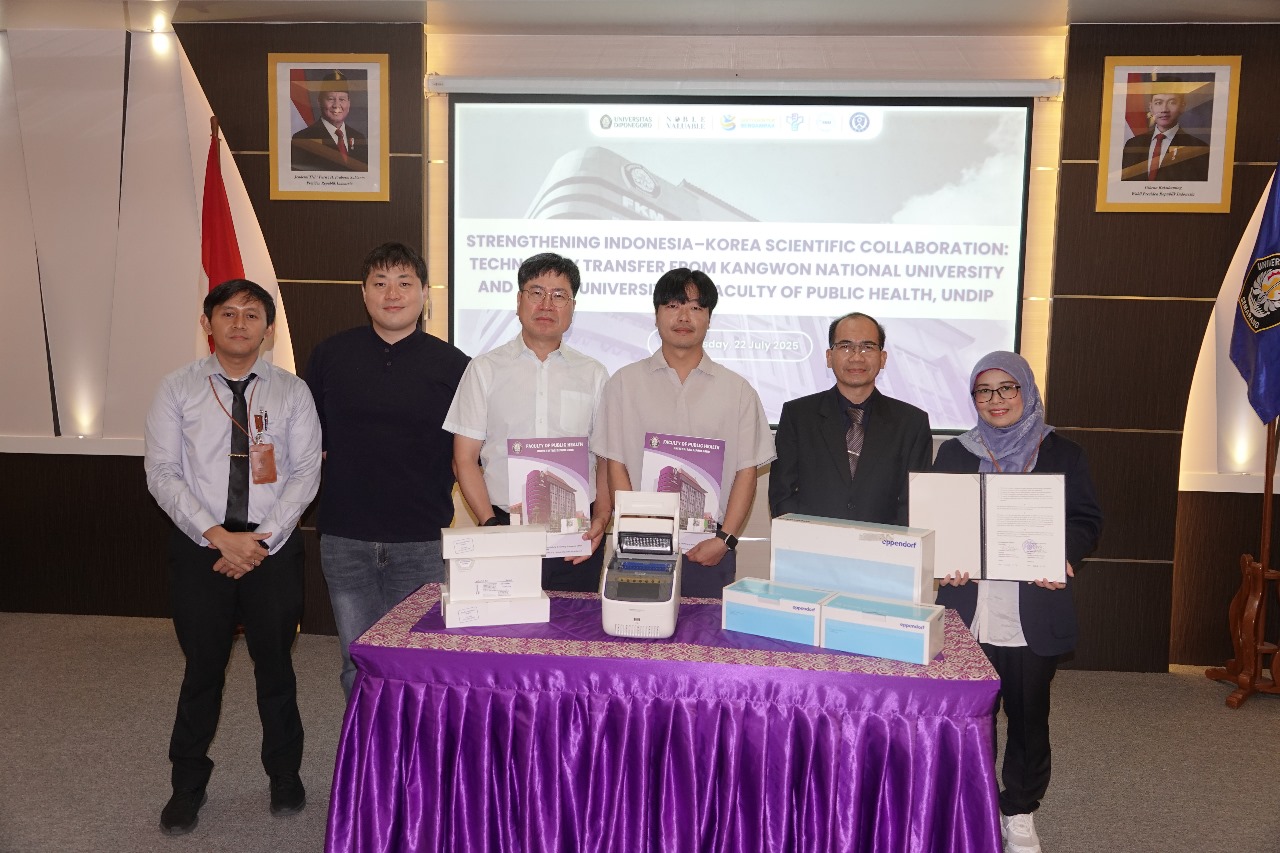Semarang, July 23, 2025 — The Faculty of Public Health, Universitas Diponegoro (FKM UNDIP), officially received a donation of molecular laboratory equipment from Kangwon National University and Yonsei University, South Korea, as an output of International Research Group/Joint Collaboration from the World Class University Program by Faculty of Public Health Universitas Diponegoro.
The handover ceremony took place at FKM UNDIP and was attended by Korean delegates including Prof. Han Jin-Hee and Dr. Jun Hojong from Kangwon National University, Prof Jeon Bo-Young and Dr Sezim Monoldorova from Yonsei University as well as four students from Kangwon National and Yonsei University. The symbolic handover was carried out by Prof. Han Jin-Hee, Prof Jeon Bo-Young, Dr Jun Hojong and received directly by Dr. Budiyono, Dean of the Faculty of Public Health UNDIP, in the presence of faculty staff and lecturers.
Under the theme “Strengthening Indonesia–Korea Scientific Collaboration: Technology Transfer from Kangwon National University and Yonsei University to Faculty of Public Health, UNDIP,” the event featured the formal transfer of various laboratory instruments including PCR machines, reagents, and molecular diagnostic kits. These tools will be utilized to support research and diagnostic services at the Malaria Center in Purworejo and FKM UNDIP’s research laboratories.
“This collaboration is an important step in strengthening our laboratory capacity, especially in early detection of infectious diseases such as malaria,” said Dr. Budiyono, Dean of FKM UNDIP.
“We sincerely appreciate the contributions from our international partners, and we are optimistic that this partnership will continue to grow in the future.”
Prof. Han Jin-Hee expressed his strong commitment to fostering transnational scientific exchange.
“We believe that international scientific collaborations not only expand knowledge but also enhance local public health capacity in a meaningful way.”
From Yonsei University, Prof. Jeon Bo-Young highlighted the importance of integrating technology with community-based actions.
“We see great potential in this collaboration — not only in improving lab diagnostics and scientific research but also in bringing science closer to the people. Technology must serve the real needs on the ground, and this partnership reflects that vision.”
Following the handover, the delegation conducted a scientific session and technical demonstration of molecular tools. FKM UNDIP’s faculty members and students engaged in learning about PCR machine functionality, cold chain management, and strategies for implementing molecular technology in field-based research, particularly for malaria and other tropical diseases.
This event also became a platform for both Indonesian and Korean researchers to discuss long-term collaboration strategies, including joint research, international publications, and the potential development of double degree programs and student exchanges.
Dr. Muh Fauzi, Head of the Master of Epidemiology Program at FKM UNDIP, welcomed the initiative:
“This is a crucial moment to strengthen our human resource capacity, laboratory infrastructure, and global research networking. The synergy with Korean partner universities will significantly enhance FKM UNDIP’s role as a center of excellence in tropical infectious disease research.”
This strategic collaboration not only strengthens FKM UNDIP’s global academic partnerships but also serves as a concrete implementation of the university’s Tridharma (three pillars) — education, research, and community service.

